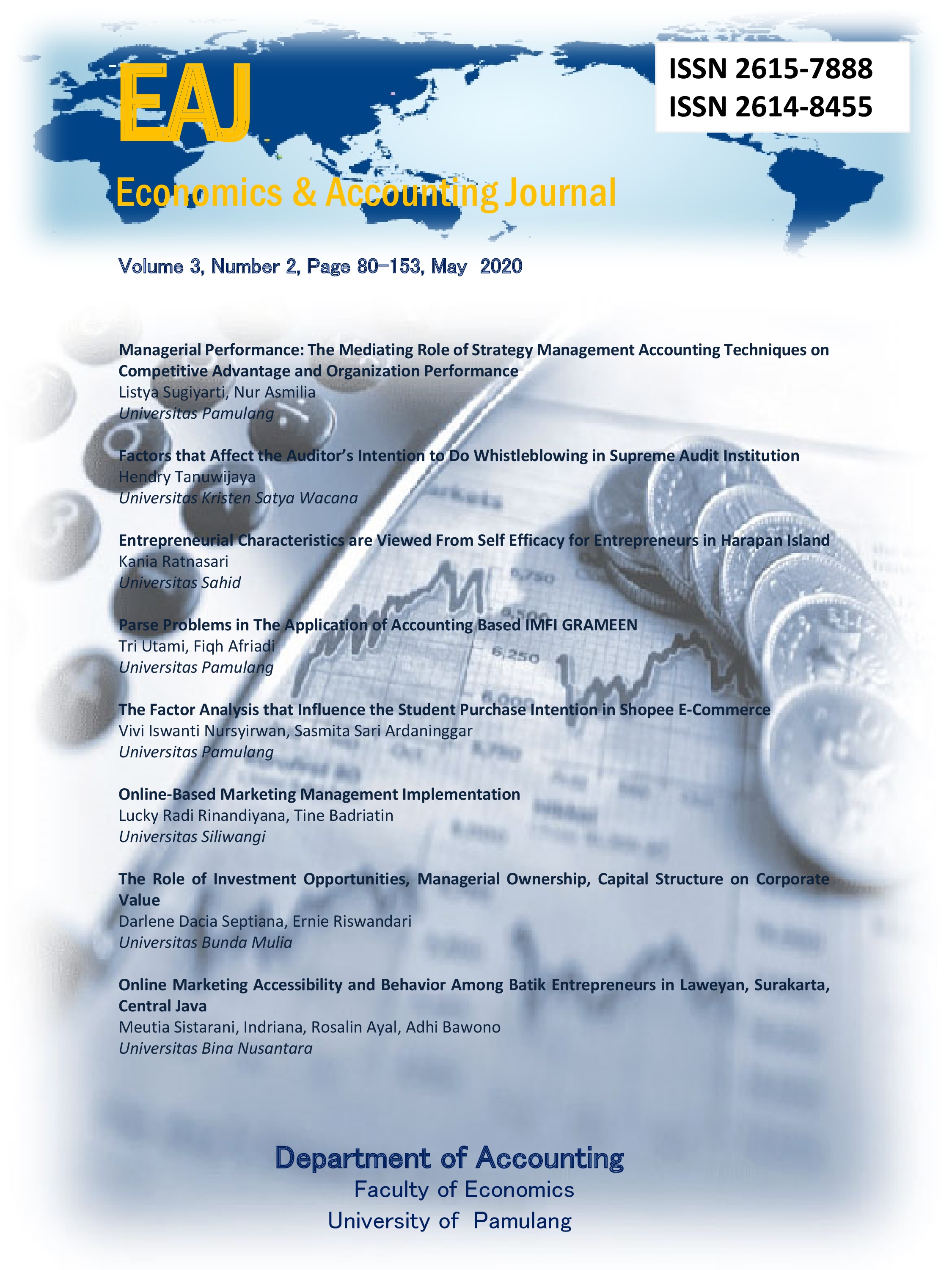The Effect Payment Methods and Services on The Satisfaction BPJS Health Members South Tangerang
DOI:
https://doi.org/10.32493/eaj.v3i3.y2020.p154-162Keywords:
Payment Methods, Service, Customer SatisfactionAbstract
As a form of good service is to see how important the implementation of good service standards in a government administration and to see if the form of public service has been in accordance with government policy which in this case is bpjs health office, especially with regard to health welfare services for the People of Indonesia especially in South Tangerang, in its implementation is still not maximal, namely by looking at some things related to the effectiveness of the community namely by looking at how the apparatus or implementing officers in serving the community , how are the regulations on the method of payment of mandatory dues of BPJS Health members, how bpjs kesehatan network activities are carried out in South Tangerang, and how the public can enjoy the service so that the community is satisfied by BPJS Health services in South Tangerang The research method is a quantitative method that emphasizes the aspect of measurement objectively towards social phenomena that are the people of BPJS health services in South Tangerang. The data collection method uses primary data. Tekning sampling used is a conviniens sample technique with respondents who are members of BPJS south tangerang city. The analysis used in this study is a multiple linear regression analysis that is with the calculation of spss through validity testing, reality testing, classic assumption testing, and multiple linear regression analysis. The results of this research show that (1) Payment methods have a positive effect on the satisfaction of members of BPJS Health, (2) BPJS Health services positively affect the satisfaction of BPJS Health members, (3) Payment methods and services BPJS Shared health the same affects the satisfaction of BPJS healthcare members.
References
. (2000). Prinsip-Prinsip Pemasaran. Jakarta: Erlangga.
. (2003). Manajemen Pemasaran. Jakarta: Indeks Kelompok Gramedia.
Andriyanto, R., Effriyanti, E., & Hidayat, A. (2018). The Effect of Spiritual Intelligence (SQ) and Personality Types on Auditor’s Ability to Detect Fraud. JABI (Jurnal Akuntansi Berkelanjutan Indonesia), 1(3), 258-268.
Aprilianto, B., & Hidayat, A. (2020). Pengaruh Bisnis E-Commerce dan Pemeriksaan Pajak terhadap Penerimaan Pajak (Studi Kasus Wajib Pajak Yang Terdaftar di KPP Kelapa Gading). EkoPreneur, 1(2), 156-168.
Azwar, A. (1996). Pengantar Administrasi Kesehatan. Jakarta: Bina Rupa Aksara.
Donnelly, Gibson. (1996) Organisasi, Prilaku, Struktur, Proses. Jakarta: Erlangga
Effendy, O. U. (1989). Kamus Komunikasi. Bandung:Informatika
Indarjati, A. (2001). Kepuasan Konsumen. Jakarta: Pranata.
Jacobalis, S. (2004). Menjaga Mutu Pelayanan Rumah Sakit. Jakarta: PT. Gramedia.
Kertodipuro, S. (1985). Dasar-dasar Organisasi dan Manajemen. Jakarta: Ghalia Indonesia.
Kotler, P. (1997). Manajemen Pemasaran :Analisis, Perencanaan, Implementasi, dan Kontrol. 10 Januari. Jakarta: PT. Prenhallindo.
Kountur, R. (2004). Metode Penelitian. Jakarta: PPM.
Kumar, A (1999). Bank Marketing Mix: New Strategy in Today Banking Sector, BPR Technologia: A Journal of Science, Tehnology & Management, Volume 2, 2013.
Kurniawan, A. (2005). Transformasi Pelayanan Publik. Yogyakarta: PEMBARUAN.
Mahmudi. (2005). Manajemen Kinerja Sektor Publik. Yogyakarta: UPP AMP YKPN.
Martadisastra, U. (2002). Azas-Azas Manajemen Konsep dan Aplikasinya. Bandung: Dinamika.
Moenir, H.A.S. (2006). Manajemen Pelayanan Umum di Indonesia. Jakarta: Bumi Aksara.
Morgan, C, T., King, R, A., Robinson, N, M. (2001). Pengantar Psikologi. Jakarta: International Book Company.
Muljono, T. P. (2001). Manajemen Perkreditan Bagi Bank Komersil. Yogyakarta: BPFE.
Siagian, S. (1995). Teori Motivasi dan Aplikasinya. Jakarta: PT. Rineka Cipta.
Sugiyono. (2011). Metode Penelitian Kuantitatif Kualitatif. Bandung: Alfabeta.
Suryawati, D., Shaluhiyah. (2006). Penyusunan Indikator Kepuasan Pasien Rawat Inap Rumah Sakit Di Provinsi Jawa Tengah. Jurnal manajemen Pelayanan Kesehatan, 09, 177-184.
Sutanta. (2003). E-Government. Jakarta: Erlangga
Sutarbi, T. (2005). Sistem Informasi Manajemen. Yogyakarta: ANDI.
Suwatno. (2001). Asas-Asas Manajemen Sumber Daya Manusia. Bandung: Suci Press.
Suyani, N. (2018). Effect Of Brand Equity And Marketing Mix On Customer Satisfaction And Impact On Customer Loyalty, EAJ (Economics and Accounting Journal) Vol 3, No 1 (2020)
Tjiptono, F. (1997). Prinsip-Prinsip Total Quality Service. Yogyakarta: Andi Offset.
Wahyono, T. (2004). Sistem Informasi Konsep Dasar, Analisis Desain dan Implementasi. Yogyakarta: GRAHA ILMU.
Zahnd, M. (2006). Perancangan Kota Secara Terpadu. Yogyakarta: Kanisius.
Published
Issue
Section
License
Copyright (c) 2024 Muhammad Sopiyana

This work is licensed under a Creative Commons Attribution-NonCommercial-ShareAlike 4.0 International License.
Authors who publish with this journal agree to the following terms:
- Authors retain copyright and grant the journal right of first publication with the work simultaneously licensed under a Creative Commons Attribution License that allows others to share the work with an acknowledgement of the work's authorship and initial publication in this journal.
- Authors are able to enter into separate, additional contractual arrangements for the non-exclusive distribution of the journal's published version of the work (e.g., post it to an institutional repository or publish it in a book), with an acknowledgement of its initial publication in this journal.
- Authors are permitted and encouraged to post their work online (e.g., in institutional repositories or on their website) prior to and during the submission process, as it can lead to productive exchanges, as well as earlier and greater citation of published work (See The Effect of Open Access).

This work is licensed under a Creative Commons Attribution-ShareAlike 4.0 International License.


